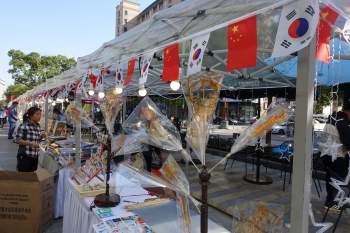The economics of Korean pop
When you hear the term K-Pop, chances are Gangnam Style by Psy pops in your head. (Editors’ note: And we’re sorry, because it will now probably stay there all day.)
But there is so much more to K-Pop than Psy, and chances are you’ll soon start hearing more proof.
South Korea is now the 11th biggest music market in the world. The most recent figures show the country raked in over $187 million in 2012, and the three big companies behind K-Pop are making a big international push.
Mark James Russell is a music journalist living in Seoul. His new book “K-Pop Now! The Korean Music Revolution” outlines the explosion of Korean pop music in the 1990s, and chronicles the acts that have kept it growing for the past three decades.
Our first question to Russell: What exactly is K-Pop, anyway?
“There’s usually upbeat dance music, it’s very loud, it’s very flashy,” he said. “To use the old Spinal Tap reference, this one goes up to 11, in Korea, they start at 11 and they go up from there.”
Russell says “Gangnam Style” isn’t exactly the best song to represent K-Pop as a whole, but its success showed South Korea that its music was exportable. The video for the song is the most viewed YouTube video of all time, closing in on 2 billion views. To Russell, that represents a shift in the American public’s view toward Asian culture.
“Asia occupies a strange mental place with people in the West. Some people think it’s exotic or weird or goofy. Often they’re laughing at it. But when people enjoyed “Gangnam Style”, it felt like they were laughing with it.”
Boy bands and girl bands called “idol groups” similar to The Backstreet Boys or The Spice Girls are the biggest sellers in Seoul. And Russell says Korean pop stars and super groups are not only expanding their reach over borders, but are actually starting to compete with other music markets before songs are even recorded.
“K-Pop from very early on was looking to get out of Korea. It was looking to become more international. So they brought in songwriters from other places. They buy a lot of music from Scandinavia. Universal Music Europe sells a lot of stuff to Korea…I’ve talked several times to the head of A&R (Artists & Repertoire) there… he has taken away songs from American artists and given them to K-Pop artists because he feels the right combination could be more profitable in Korea.”
Russell says Korea’s embrace of K-Pop doesn’t just show an evolving taste in music, it represents a political and economic turnaround for a country that just a few decades ago looked drab and isolated.
“It’s been a whole series of changes that go back quite a ways. From the rise of democracy and the Olympics in ’88 (to) the country just opening up, it’s become a much more lifestyle-oriented country. For many years people worked very long hours six days a week. But now people have more money and more free time, and they want to fill that time with fun things.”
There’s a lot happening in the world. Through it all, Marketplace is here for you.
You rely on Marketplace to break down the world’s events and tell you how it affects you in a fact-based, approachable way. We rely on your financial support to keep making that possible.
Your donation today powers the independent journalism that you rely on. For just $5/month, you can help sustain Marketplace so we can keep reporting on the things that matter to you.


















